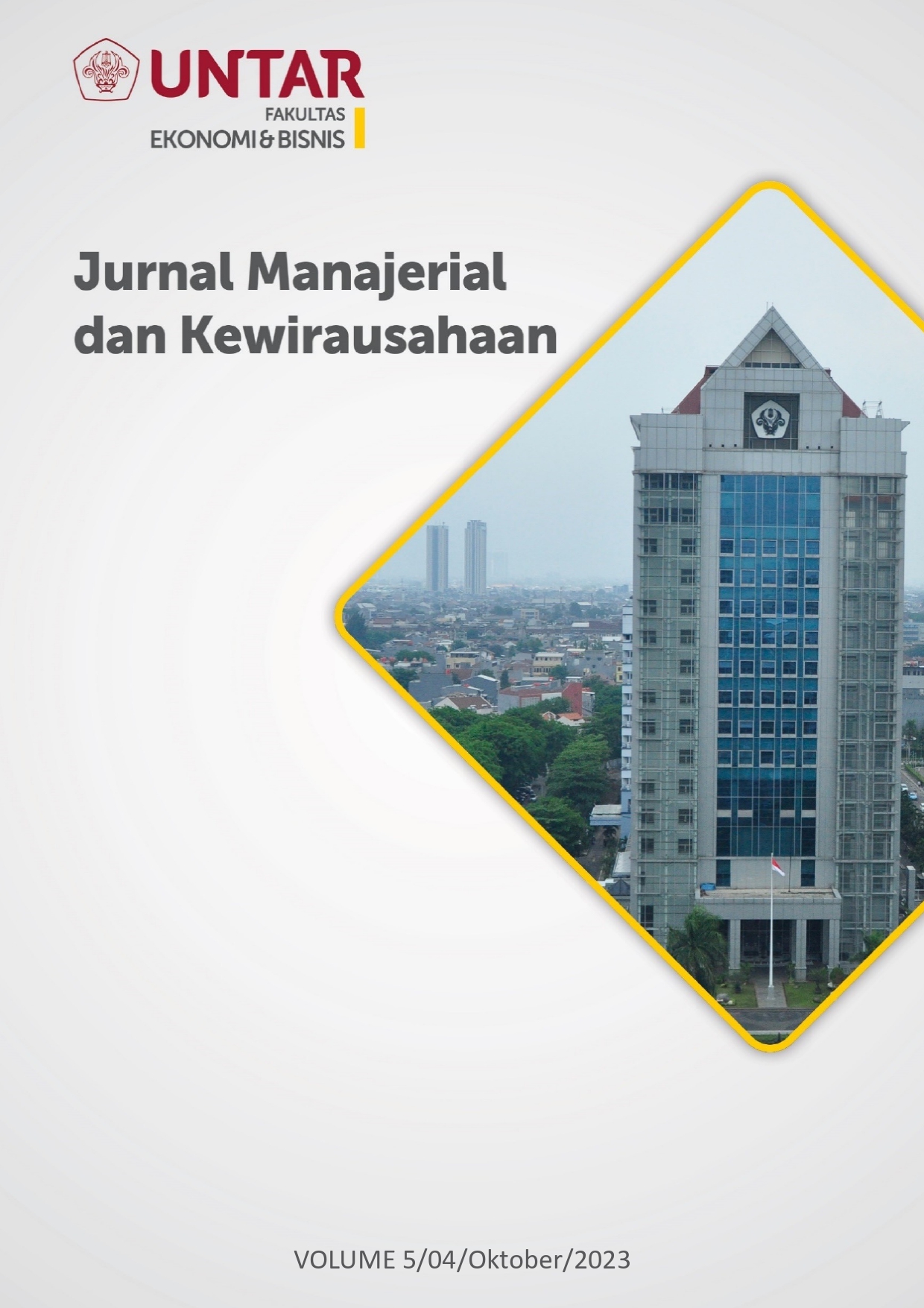Pengaruh Overconfidence, Representativeness dan Herding Behavior terhadap Keputusan Investasi Saham Generasi Milenial di Jakarta
Main Article Content
Abstract
As the number of investors in the Indonesian capital market increases, it is interesting to study how investors make investment decisions. Investor decision making is influenced by certain biases described in the literature. There is a trend in which psychological factors such as overconfidence, representativeness and herding behavior also influence investment decisions. Bias behavior is rife in the millennial generation because of their relatively young age and are considered to have uncontrolled and high emotional levels that can cause them to make investment decisions too quickly. This researche aims to examine the effect of overconfidence, representativeness and herding behavior on stock investment decisions. The population in this study is all millennials aged between 20-40 years in Jakarta. The selected sample was 100 participants who had at least 3 months of investment experience in the capital market. The research design is descriptive. This type of research is quantitative. The sampling technique in this study was purposive sampling. There are two stages in conducting the analysis, namely the evaluation of the measurement model and the evaluation of the structural model. Data was collected through a questionnaire. This research was conducted using the SEM-PLS approach supported by SmartPLS 4.0.8.4 software. The results in this study found that overconfidence and representativeness had a positive and significant effect on stock investment decisions. While herding behavior has no significant positive effect on investment decisions. This is because the herding behavior factor has not been tested to be significant on stock investment decisions.
Article Details
Section

This work is licensed under a Creative Commons Attribution-NonCommercial-ShareAlike 4.0 International License.
This work is licensed under a Jurnal Muara Ilmu Ekonomi dan Bisnis Creative Commons Attribution-ShareAlike 4.0 International License.,/p>
References
Addinpujoartanto, N. A., & Darmawan, S. (2020). Pengaruh Overconfidence, Regret Aversion, Loss Aversion, Dan Herding Bias Terhadap Keputusan Investasi Di Indonesia. Jurnal Riset Ekonomi Dan Bisnis, 13(3), 175. https://doi.org/10.26623/jreb.v13i3.2863
Afriani, D., & Halmawati, H. (2019). Pengaruh Cognitive Dissonance Bias, Overconfidence Bias Dan Herding Bias Terhadap Pengambilan Keputusan Investasi. Jurnal Eksplorasi Akuntansi, 1(4), 1650–1665. https://doi.org/10.24036/jea.v1i4.168
Ar-Rachman, A. R. (2018). Pengaruh Overconfidence Bias Dan Bias Optimisme Terhadap Pengambilan Keputusan Investasi Pada Investor di Yogyakarta. Journal of Chemical Information and Modeling, 53(9), 287.
Azhari, R. (2021). Pengaruh Bias Representative terhadap Keputusan Investasi di Pasar Modal. Borneo Student Research, 2(2), 1424–1430.
Baker, H. K. (2021). Personality traits and investor sentiment. 354–369. https://doi.org/10.1108/RBF-08-2017-0077
Budiarto, A. (2017). Pengaruh Financial Literacy, Overconfidence, Regret Aversion dan Risk Tolerance Terhadap Keputusan Investasi (Studi pada investor PT. Sucorinvest Central Gani Galeri Investasi BEI Universitas Negeri Surabaya). Jurnal Ilmu Manajemen, 5(2), 1–9.
CNBC Indonesia. (2022). OJK : 5 Tahun Lagi, Milenial Akan Mendominasi Pasar Modal, from https://www.cnbcindonesia.com/market/20220614145532-17-347000/ojk-5-tahun-lagi-milenial-akan-mendominasi-pasar-modal.
Degross, J. I., Chin, W. W., & Marcolin, B. L. (1996). Proceedings Of The Seventeenth A Partial Least Squares Latent Variable Modeling Approach For Measuring Interaction Effects: Results from A Monte Carlo Simulation Study and Voice Mail Emotion/Adoption Study.
Ghozali, Imam. (2021). Partial Least Squares Konsep Teknik dan Aplikasi Menggunakan Program Smart PLS 3.2.9. Semarang: Universitas Diponegoro Semarang.
Jakarta.bps.go.id. (2020). Jumlah Penduduk Hasil Sensus Penduduk 2020 Menurut Generasi dan Kabupaten/Kota di Provinsi DKI Jakarta, from https://jakarta.bps.go.id/statictable/2022/07/20/504/jumlah-penduduk-hasil-sensus-penduduk-2020-menurut-generasi-dan-kabupaten-kota-di-provinsi-dki-jakarta.html
Jannah, W. (2017). Analisis Fundamental, Suku Bunga, Dan Overconfidence Terhadap Pengambilan Keputusan Investasi Pada Investor Di Surabaya. Ekspektra : Jurnal Bisnis Dan Manajemen, 1(2), 138–155. https://doi.org/10.25139/ekt.v0i0.338
Kustodian Sentral Efek Indonesia. (2022). Investor Pasar Modal Tembus 10 Juta – KSEI, from https://www.ksei.co.id/files/uploads/press_releases/press_file/id-id/212_berita_pers_investor_pasar_modal_tembus_10_juta_20221202065619.pdf
Mahadevi, S. A., & Asandimitra, N. (2021). The Influence of Status Quo, Herding Behavior, Representativeness Bias, Mental Accounting, and Regret Aversion Bias on Millennial Investors Investment Decisions in Surabaya City. Journal of Management Sciences, 9(2), 779–793. https://doi.org/10.26740/jim.v9n2.p779-793
Puspitaningtyas, Z. (2021). Perilaku investor dalam pengambilan keputusan investasi saham. SKRIPSI Mahasiswa UM, December. http://mulok.library.um.ac.id/index3.php/82632.html
Salsabilla, N. H., Utama, R. A., Riantiningrum, P. S., & Rahmawati, S. A. (2021). Analisis Faktor Motivasi, Kemajuan Teknologi, dan Literasi Keuangan terhadap Minat Generasi Milenial dalam Berinvestasi Saham. Prosiding National Seminar on Accounting, Finance, and Economics (NSAFE), 1(7), 73–79.
Sekaran, Uma, Bougie, Roger. (2020) Research Methods For Business: A Skill Building Approach (8th ed. (Asia Edition). Hoboken: Wiley.
Seto, A. A. (2017). Behavioral Biases Pada Individual Investor. Ilmiah Ekonomi Global Masa Kini, 8(01), 6–11. http://dx.doi.org/10.36982/jiegmk.v8i1.293
Setyawan, I. R. & Ramli, I. (2016). Herding Behavior in the Indonesian Stock Exchange: the Roles and Contributions of Foreign Investors during the Period 2006 to 2011. Jurnal Pengurusan, 46, 125-135. http://dx.doi.org/10.2139/ssrn.2313036
Widiar Pradana, R. (2018). Pengaruh Financial Literacy, Cognitive Bias, Dan Emotional Bias Terhadap Keputusan Investasi (Studi Pada Investor Galeri Investasi Universitas Negeri Surabaya). Jurnal Ilmu Manajemen (JIM), 6(3), 108–117.
Widoatmodjo, S. (2015). Pengetahuan Pasar Modal untuk Konteks Indonesia. Elex Media Komputindo.
Wiryaningtyas, D. P. (2016). Behavioral Finance dalam Pengambilan Keputusan. UNEJ E-Proceeding, 339–344.

